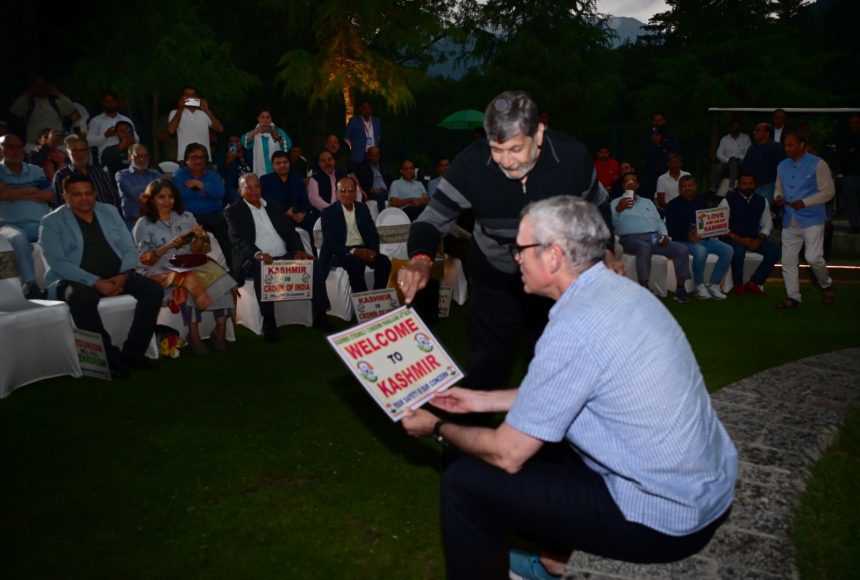
In a poignant and timely move, Jammu and Kashmir Chief Minister Omar Abdullah has announced plans to construct a memorial at Baisaran, near Pahalgam, to commemorate the 26 lives lost in the devastating terrorist attack of April 22. Among the victims were 25 tourists who had come to enjoy the breathtaking beauty of Kashmir’s spring, and Syed Adil Shah, a local resident hailed as a hero for laying down his life while trying to protect the visitors.
This announcement is more than just a symbolic gesture. It represents a crucial step in acknowledging the pain of those who lost their loved ones, honoring their memory, and confronting the ongoing threat of terrorism with the strength of collective remembrance. The picturesque meadow of Baisaran, often referred to as ‘Mini Switzerland’ for its serene landscape, will now carry a dual legacy — one of natural beauty, and one of solemn tribute.
The Jammu and Kashmir Assembly’s unanimous condemnation of the attack as a “heinous and cowardly act” reinforces the rare but necessary political unity in times of tragedy. The passing of a resolution to honor the deceased not only offers moral support to the victims' families but also sends a clear message that violence will not be allowed to dictate the region’s future.
CM Abdullah’s response has so far demonstrated both empathy and action. His decision to convene an all-party meeting signaled a willingness to set aside partisan divides for the sake of public safety and regional stability. Furthermore, the provision of ex-gratia compensation for the bereaved families underscores the government's recognition of its responsibilities in the wake of such atrocities.
Importantly, Abdullah acknowledged the wave of public outrage following the incident, suggesting that this collective grief and anger could serve as a turning point in Kashmir’s long struggle against militancy. If channeled constructively, this moment could galvanize efforts not only to curb violence but also to foster unity and healing.
The proposed memorial at Baisaran should not merely stand as a reminder of loss, but as a symbol of resilience — of a community that refuses to be broken, and of a government that recognizes its duty to remember, to protect, and to rebuild.
As Kashmir continues its journey toward peace, such acts of remembrance are essential. They anchor the present to the past while pointing firmly toward a future defined not by fear, but by hope and unity.
In a poignant and timely move, Jammu and Kashmir Chief Minister Omar Abdullah has announced plans to construct a memorial at Baisaran, near Pahalgam, to commemorate the 26 lives lost in the devastating terrorist attack of April 22. Among the victims were 25 tourists who had come to enjoy the breathtaking beauty of Kashmir’s spring, and Syed Adil Shah, a local resident hailed as a hero for laying down his life while trying to protect the visitors.
This announcement is more than just a symbolic gesture. It represents a crucial step in acknowledging the pain of those who lost their loved ones, honoring their memory, and confronting the ongoing threat of terrorism with the strength of collective remembrance. The picturesque meadow of Baisaran, often referred to as ‘Mini Switzerland’ for its serene landscape, will now carry a dual legacy — one of natural beauty, and one of solemn tribute.
The Jammu and Kashmir Assembly’s unanimous condemnation of the attack as a “heinous and cowardly act” reinforces the rare but necessary political unity in times of tragedy. The passing of a resolution to honor the deceased not only offers moral support to the victims' families but also sends a clear message that violence will not be allowed to dictate the region’s future.
CM Abdullah’s response has so far demonstrated both empathy and action. His decision to convene an all-party meeting signaled a willingness to set aside partisan divides for the sake of public safety and regional stability. Furthermore, the provision of ex-gratia compensation for the bereaved families underscores the government's recognition of its responsibilities in the wake of such atrocities.
Importantly, Abdullah acknowledged the wave of public outrage following the incident, suggesting that this collective grief and anger could serve as a turning point in Kashmir’s long struggle against militancy. If channeled constructively, this moment could galvanize efforts not only to curb violence but also to foster unity and healing.
The proposed memorial at Baisaran should not merely stand as a reminder of loss, but as a symbol of resilience — of a community that refuses to be broken, and of a government that recognizes its duty to remember, to protect, and to rebuild.
As Kashmir continues its journey toward peace, such acts of remembrance are essential. They anchor the present to the past while pointing firmly toward a future defined not by fear, but by hope and unity.
© Copyright 2023 brighterkashmir.com All Rights Reserved. Quantum Technologies